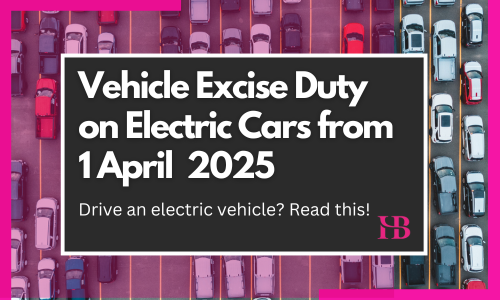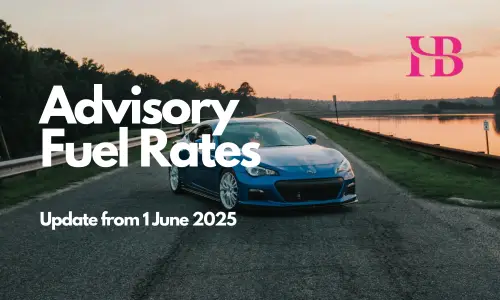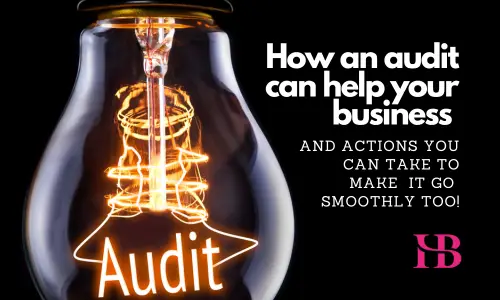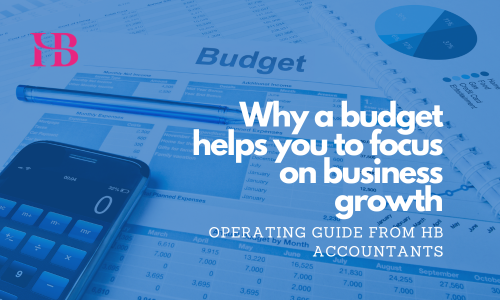If you drive an electric vehicle, you need to be aware of these changes to road tax. Currently, electric vehicles (EVs) are exempt from Vehicle Excise Duty (VED) also known as road tax. However, from 1 April 2025, drivers of electric and low emission cars, vans and motorcycles in the UK will need to pay VED, in the same way that drivers of petrol and diesel cars do. In addition, electric cars with a list price that exceeds £40k will no longer be expempt from the “expensive car” supplement.

How the VED tax changes will affect your vehicle
Zero emission cars first registered before April 2017
Zero and low emission cars first registered between 1 March 2001 and 30 March 2017 currently in Band A will move to the Band B rate, currently £20 a year
Zero emission cars first registered between 1 April 2017 and 31 March 2025
Drivers will pay the standard rate under the existing VED system. This is £190 for 2024 but is subject to change for 2025.
Electric and low emission cars registered on or after 1 April 2025
During the first year, drivers will need to pay the lowest first year rate of vehicle tax that applies to vehicles with CO2 emissions 1 to 50g/km. From the second tax payment onwards, these vehicles will pay the standard rate. This is £190 for 2024 but is subject to change for 2025.
Hybrid and alternatively fuelled vehicles (AFVs)
The £10 annual discount for hybrid and AFVs will be removed, and the rate that paid will depend on when the vehicle was first registered. If the vehicle was:
- registered before 1 April 2017 – this rate will depend on the vehicle’s CO2 emissions (check the current rates for this vehicle)
- registered on or after 1 April 2017 – you will pay the standard rate (this is £190 for 2024 but is subject to change for 2025)
Electric vans
Most electric vans will move to the standard annual rate for light goods vehicles. Check the current rates for this vehicle. The current rate is £335 a year for most vans.
Electric motorcycles
Electric motorcycles and tricycles will move to the annual rate for the smallest engine size. This is currently £25 per year. Check the current rates for this vehicle.
Additional rate (expensive car supplement)
For new electric vehicles with a list price exceeding £40,000, you will now need to pay the expensive car supplement from the second tax payment onwards. This applies to vehicles registered on or after 1 April 2025.
Since April 2017, cars with a list price exceeding £40,000 pay an additional supplement as well as paying the standard rate, which means those who can afford the most expensive cars pay more than the standard rate imposed on other drivers.
The expensive car supplement is paid in addition to the standard rate for a period of five years from the start of the second vehicle licence but for a period of no longer than six years from when the vehicle was first registered.
More about the expensive car supplement may be found here.
Should you still consider owning an electric vehicle?
As these road tax changes indicate, a low emission vehicle is becoming more expensive to run when compared to a few years ago. The HB team are fans of EVs, as you may have read in our previous blogs. But as more people make the switch to electric vehicles, the amount of road tax is falling and we guess the government is now looking to make up the difference.
If you are considering making the switch to an EV, or deciding whether to keep your low emission fleet, here are some other considerations, focused on the annual payments the drivers of electric vehicles should be aware about:
- Electricity costs: Charging an electric car at home will increase your electricity consumption. The cost will depend on the efficiency of your vehicle, local electricity rates, and the number of miles you drive.
- Car insurance: Vehicle insurance is something all drivers must have before they get behind the wheel. The cost of insuring an electric car can vary depending on factors such as your driving history, the specific vehicle model, and the insurance provider.
- Maintenance: Electric cars generally have fewer moving parts and require less maintenance compared to traditional combustion engine vehicles. However, when things go wrong, they tend to go really wrong and we’re only just learning about battery life spans and the cost of replacement batteries.
How can we help you?
The HB team is always available to support your accountancy needs including supporting any decisions about the most tax efficient and cost effective way to manage your company vehicles and fleet.
If you would like to learn more about the services that we offer, discover how we can give you real confidence in the future of your business, or if you are a larger business that requires auditing, then contact us today. We’re accountants for business and we are here to help you grow efficiently.
The information contained above is for general guidance purposes only. Whilst every effort has been made to ensure the contents are accurate, please note that each individual has different circumstances and it is essential that you seek appropriate professional advice before you act on any of the information contained herein. HB Accountants can accept no liability for any error
Read Our Latest Blogs Below
- Mandatory Identity Verification for UK Companies from 18 November ‘25: Are You Ready?
 What’s my Companies House VIN number? You may recall our earlier blog on identity verification (why and how to verify via Companies House). As of 5 August 2025, Companies House confirmed that the requirement will become mandatory from 18 November 2025.
What’s my Companies House VIN number? You may recall our earlier blog on identity verification (why and how to verify via Companies House). As of 5 August 2025, Companies House confirmed that the requirement will become mandatory from 18 November 2025. - HMRC Advisory Fuel Rates (AFRs) from 1st June 2025
 HMRC has published the latest Advisory Fuel Rates (AFRs) which apply from 1 June 2025. AFRs are the official rates used when reimbursing employees for business mileage in company cars. They’re reviewed every quarter (February, May, August and November) and adjusted in line with fuel prices.
HMRC has published the latest Advisory Fuel Rates (AFRs) which apply from 1 June 2025. AFRs are the official rates used when reimbursing employees for business mileage in company cars. They’re reviewed every quarter (February, May, August and November) and adjusted in line with fuel prices. - How an audit can help your business (and actions you can take to make it go smoothly too!)
 An audit may be a legal requirement for your business but a well managed audit can also boost your business growth and ensure that it is operating in the best way possible.
An audit may be a legal requirement for your business but a well managed audit can also boost your business growth and ensure that it is operating in the best way possible. - Why a budget helps you to focus on business growth
 Are you looking for clarity over the future direction of your business? Do you want to know the actions you should take in order to grow your business? Then consider taking time to create a budget for your business.
Are you looking for clarity over the future direction of your business? Do you want to know the actions you should take in order to grow your business? Then consider taking time to create a budget for your business. - How a SME Owner Can Create More Time
 SME owners and managers – are you part of the one in five small and medium-size enterprise managers that work on average an additional 3 hours a day on a regular basis? Or one of the 33% that claim that there just aren’t enough minutes in a day to get everything completed? (The Independent study … Continue reading
SME owners and managers – are you part of the one in five small and medium-size enterprise managers that work on average an additional 3 hours a day on a regular basis? Or one of the 33% that claim that there just aren’t enough minutes in a day to get everything completed? (The Independent study … Continue reading - A New Academic Year for our Student in Zambia
 As the new academic year unfolds in Zambia, we are delighted to share an update about our sponsored student, Getrude. Currently in her second year at Chalimbana University, Gertrude is studying Business Administration in Accounting and Finance.
As the new academic year unfolds in Zambia, we are delighted to share an update about our sponsored student, Getrude. Currently in her second year at Chalimbana University, Gertrude is studying Business Administration in Accounting and Finance.

